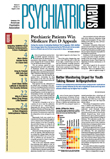The federal budget is a blueprint for establishing the nation's priorities in critical areas such as health care, education, transportation, commerce, natural resources, and defense. Of particular interest to APA members are those areas of the federal budget that affect how physicians practice medicine, how they are reimbursed for their services, and what types of professionals are allowed to provide health care.
Other key health-related issues decided at the federal level concern access to medical care and whether insurers must cover mental health services at parity with other services. In addition, the federal government controls much of the basic medical research funding in the United States, as well as the level of medical care available to people in the military. Decisions related to all of these issues have a significant impact on our profession, the medical field, and, above all, our patients.
Unfortunately, the decisions are made in a bitterly polarized atmosphere—one in which the scarcity of financial resources to fund priorities is an ever-present reality.
Given the atmosphere surrounding the budget process, it is therefore crucial for psychiatrists and other physicians to advocate actively during this important political process. It is evident that our efforts as advocates are essential for the patients, the profession, and the field. APA members should be very pleased with the Association's vibrant, well-planned, grass-roots advocacy program.
We have plenty of reasons to be hopeful that lawmakers and policymakers are hearing APA's important message. I realize that sometimes it is hard to see how our individual advocacy efforts can have much of an impact on the massive federal budget, but be assured that those efforts can and do make a difference.
A concrete example will help illuminate the positive outcomes of our advocacy efforts. Over the past several months, APA's grass-roots efforts have resulted in two significant victories related to the federal budget process. The first relates to the Senate's approval of the Specter-Harkin funding amendment. The second pertains to successfully urging moderate Republican House members to support additional funding for public health concerns in its version of the budget for Fiscal 2007.
The Specter-Harkin amendment added $7 billion to the Senate's version of the Budget Resolution for Fiscal 2007, of which more than $1 billion would be designated to fund research at the National Institutes of Health. Initially, prospects for successful passage looked dim but with the assistance of members of APA's grass-roots advocacy network contacting their senators to encourage support, the amendment was overwhelmingly approved.
The House budget was delayed for several weeks as House GOP leadership lacked the votes necessary to pass its version of the House Budget Resolution (H Con Res 376). APA worked successfully with many health advocacy organizations to persuade moderate Republicans not to support the House budget resolution, as it did not contain adequate funding for health and social service programs. The personal advocacy of many APA members helped postpone a vote that could have resulted in harmful cuts to health care programs. The delay forced House leadership to increase funding for health and other domestic programs.
In an election year such as this, it is especially important that members of Congress hear the voices of individual constituents and what is important to them. Your role as physicians and psychiatrist advocates is even more important than usual in this critical period leading up to November, when elections will be held for every seat in the House of Representatives and one-third of those in the Senate. Your active participation in APA's Grass-Roots Action Network can influence the shape of the federal budget and the priorities Congress sets for health care policy.
APA's Department of Government Relations will continue to keep you informed as the budget process evolves, including ways in which you can help the effort to preserve critical health care funding. It is possible that the House will not be able to pass its version of the Fiscal 2007 budget, thus making the Senate Budget Resolution the prevailing guideline for domestic programs. This usually indicates that funding bills will be combined into an“ omnibus” spending measure after Thanksgiving.
As physicians and as psychiatrists, we have a responsibility to speak up for our patients and the future of biomedical research. As a country, we must allocate our funds wisely or pay an even higher price in human suffering and societal costs. These challenges are daunting. It will not be easy, but as recent events have demonstrated, we can be successful. Please join me in these critical advocacy efforts. Together we can achieve our objectives. ▪

